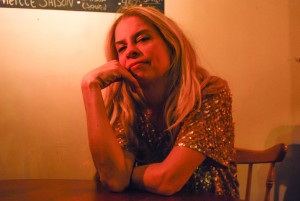She was only Danish artists at the time to pick up the steel guitar – and was headhunted by Jack White. Meet Maggie Björklund before her job at the SPOT Festival.
By David Meffe, Jutland Station.
It’s dark as a small Saturday Aarhus crowd mumbles over beers, sitting by awkwardly placed tables or standing just far away from the stage to make it clear this isn’t going to be a punk show. Through a tuft of wild blonde hair shining in the limelight, Maggie Björklund takes the stage solo, cloaked in low mood light – there are no forced introductions or complementary waves. Calm, cool and collected, the artist gets right down to business, straddling her steel pedal guitar and unleashing the first vibrating wail that cuts through the crowd and sends an almost tangible shiver through the candles.
But considering Maggie’s virtuoso status and an impressive resume of musical collaborations over the past few years, Voxhall’s Atlas concert venue seems somewhat low-key. Something in her stance tells the audience this is exactly the way she wants it.
“It was kind of always a love story with this instrument, I felt very close with it. But I knew if I wanted to make it my main instrument, then Denmark was too small,” she laughs.
“People like pedal steel here…but they don’t like too much of it”
Despite this, the Copenhagen native knows her market, and wastes no time showing off exactly why she earns her reputation as one of the very best. Reticent rock star though she may be, it seems as though Denmark has finally embraced it’s not-so-long lost psychedelic blues prodigal daughter.
Though not the most popular instrument among young musicians looking to invade the international scene, the steel pedal guitar inhabits the world of country and blues music, often providing background flair, though it’s rare to see it centre stage at a concert. If you’ve never laid eyes on one, it’s sort of the creepy bastard child of an electric guitar still trying to figure out whether a harp or a Theremin is the real father – paternity tests are pending. Players lay the instrument flat on a stand and slide a metal bar along the strings while adjusting the sound with various pedals and effects.

Maggie Bjørklund: – It was kind of always a love story with this instrument, I felt very close with it. But I knew if I wanted to make it my main instrument, then Denmark was too small. (Photo: Tommy Frost)
The Copenhagen native remembers falling into the odd instrument through a love of country music, not an especially popular genre growing up in Denmark.
“Nobody played the steel pedal guitar in Denmark at that time. Nobody,” she says. By sheer coincidence, she jumped on an offer to buy a cheap beginner model about 14 years ago. “I don’t even remember what I paid for it, but it wasn’t much. I remember struggling to put it together at first, it was a lot harder than I thought to play and it took a while before it really dawned on me how to work it. But once I did, I completely fell in love with the sound. I just kind of knew I wanted to make it my instrument.”
The sound is really more of a slow musical wail than what you’d normally expect from a lead instrument, but Maggie manages to bring out its prominence with a sort of sincere originality that suspends belief in its back-bencher status. Her reputation as a bona fide blues badass even grabbed the attention of former White Stripes frontman Jack White, who in 2012 invited her to record and tour with his all-female backing band The Peacocks.
“He needed someone like me, and he found me. He knew of my music and contacted me for his Blunderbuss tour,” she says.“It was great fun, it’s amazing to work with a guy like that and tour the world.”
In 2014 Maggie released her second solo album Shaken, the follow-up to 2011’s Coming Home, a blues-laced folk tribute to life, love, death and everything in between.
“Sometimes life overtakes you and throws your plans aside, and you have to go with what’s there.”
Prior to recording, Maggie’s mother fell ill and the artist alternated between hospital visits and working on the new record. “That time of saying goodbye to her happened by coincidence to be the exact time I needed to sit down and write the album.”
The day after the funeral, Maggie flew to England to begin recording.
“It just so happened that the end of my writing process was the end of her life. It all worked out”

Maggie Bjørklund: Sometimes life overtakes you and throws your plans aside, and you have to go with what’s there. (Photo: Daphne Henning).
Released on Chicago-based Bloodshot Records, the album ranges from slow country ballads to more complex musical arrangements that show off the artist’s versatility and vocal range. The album even features collaborations with artists like Kurt Wagner (Lambchop) and John Convertino (Calexico), demonstrating the real reach of Maggie’s musical rolodex.
“It’s a huge thing to lose a parent; there’s a life before and a life after” she says. “And it’s not all songs on the album that are sad and about this. It was more of a way to celebrate life.”
While tracks like ‘Name in the Sand’ showcase a more radio-friendly vibe, instrumental numbers like ‘Missing at Sea’ pull listeners to a through a psychedelic folk blues kaleidoscope strung up in dark mysterious serious tones of vibrating hypnosis.
“The music scene in Denmark has changed a lot, and changed for the better,” she says, noting that Danish artists are increasingly looking outside of the country for greater reach.
“Everyone on this planet is globalized, and musicians are globalized.”
“It’s a good thing that they’re all aiming to be international. Here we come, world.”
Back at the concert, Maggie finishes her cryptic intro as she’s joined by touring bandmates Convertino, Barb Hunter and John Parish, on percussion, cello and guitar. Into the microphone she whispers the opening lyrics to ‘Walking.’
“Ice in a glass, and I held it to cool the palm of my hand.”
Through a barely veiled smile, Maggie watches from the stage as the audience slowly melts under flickering candlelight.
– – –
David Meffe is a Canadian freelance journalist, photographer and blogger from Montreal – his work focuses on human rights, development and music.
www.jutlandstation.dk